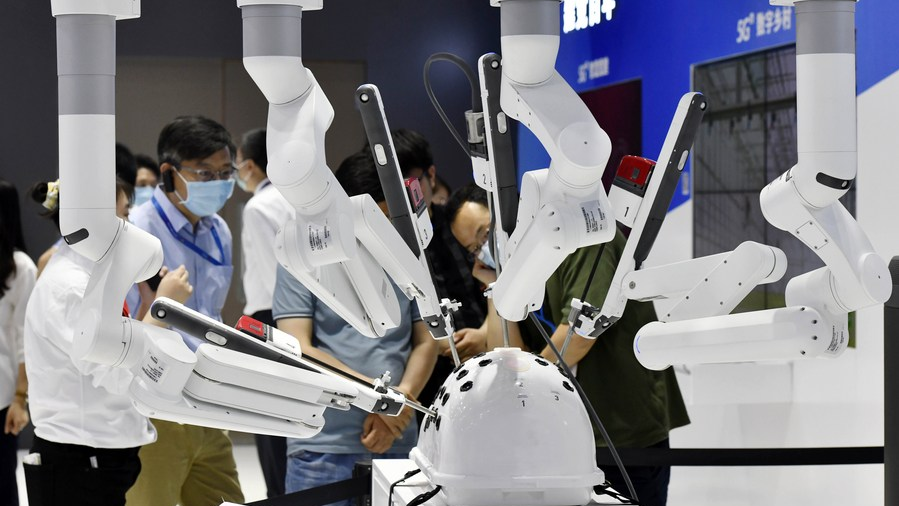
People view surgical robots at the World Intelligence Congress in north China's Tianjin Municipality, May 20, 2021. [Photo/Xinhua]
By Ruqiya Anwar
Artificial intelligence (AI) has shown great potential in developing innovations that transform industries, including transportation, energy, and others. Although big data, machine learning, and other related technologies are all included in AI, it will have an equally transformational impact on trade and national security over the next two decades as semiconductors, computers, and the web did over the past quarter.
Notably, the Joe Biden administration on October 7 announced additional measures to limit Chinese corporations' access to high-performance computing technologies. The new measures, according to Reuters, could amount to the "biggest" move taken by Washington to restrict China's access to breakthrough technology since the 1990s.
The expanded restrictions are based on a broadening of the so-called foreign direct product rule —an especially punitive trade policy since it applies to any firm that uses American equipment or software to produce semiconductors, not just those in the United States. These businesses will suffer, as will their clients, who include well-known Chinese digital platforms and electronics manufacturers.
However, despite these restrictions, China will lead the global artificial intelligence industry. Governments all around the globe are scrambling to encourage AI innovation, but it seems that none has released a plan as comprehensive as China, and more crucially, it has the power to implement its plans. This is because the Chinese government can do things Western democracies cannot do.
Significantly, China will be the world's leading researcher and user of AI. The Chinese are not only well-prepared with a plan, but have a history of completing big, ambitious projects. Its Belt and Road Initiative and its drive for "mass entrepreneurship and innovation," according to Chinese Premier Li Keqiang, are altering significant portions of the world.
Similarly, Since China's entrepreneurial culture has advanced so quickly in the last decade, certain Chinese technological businesses, such as Tencent and Alibaba, are worth more than their American competitors.
According to Kai-Fu Lee, a key figure in the Chinese technology industry, the West must understand that China is ahead in many technologies and business models, goods, and features. For instance, China outperforms the U.S. by a wide margin when comparing WeChat to Facebook Messenger or WhatsApp, Weibo to Twitter, and Alipay to Apple Pay.
China is progressing in AI by fusing decades of expertise in developing frontier technology with analyzing national security decision-making. Regarding economic and national security uses of AI, China competes with the United States on an equal footing throughout the complete spectrum. China isn't only attempting to get the hang of AI; it's also mastering it.
Over the past decade, China has been able to close the gap with American leaders in this sector owing to its advantages in size, collecting data, and national spirit. However, it will eventually surpass the United States in the future, given its current trend.
Most importantly, leading information technology corporations will invest their research and development budgets in the artificial intelligence revolution, including the "FAANG" (Facebook, Amazon, Apple, Netflix, and Google) and "BATS" (Baidu, Alibaba, and Tencent). We have entered a golden age of artificial intelligence which will drive future economic growth and national security. From face recognition to5G, China is not simply playing catch-up. In many instances, it has surpassed the United States to become the uncontested global leader.
China's government has accelerated the development of its AI capabilities, with Chinese President Xi Jinping urging his nation to take the position of "a global leader in science and technology." China is creating the intellectual groundwork for a millennial advantage in AI. Hence, Americans should investigate safer alternatives to an unrestrained AI race, maybe helping to establish a new U.S.-China partnership.
Ruqiya Anwar, a PhD scholar of Media and Communication Studies from Pakistan, is a researcher and socio-political analyst.

 中文
中文



